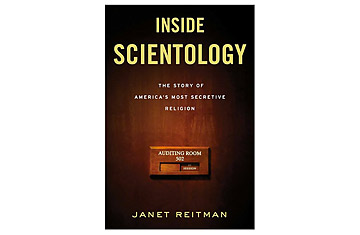
(2 of 2)
Historically, Scientology has been known for being secretive and controlling. What kind of access did they give you?
In early 2006, I was invited out to Southern California and spent three days at their L.A. headquarters and also their international base in the desert with Tommy Davis, then an official with the church's Celebrity Centre, and Mike Rinder, who at the time was the head of Scientology's office of special affairs and its chief spokesman. We talked about virtually every aspect of Scientology, from its core doctrine to its treatment of defectors. They have to pick and choose their battles, and they have been dealing with a number of high-level defections. What they're worried about, far more than what we think of them, is what their own members think of them. With the Internet they run the risk of their members reading all sorts of things.
The Web has become a big forum for ex-Scientologists, who post all sorts of formerly secret documents. Would this book have been possible 10 years ago?
I would not have been able to write it because a lot of the people who were so central to the story of Scientology were not yet out of the church, or were out but isolated from one another. The Internet has served to unite many ex-Scientologists into a community, and that has been tremendously empowering for these people, and emboldening. As a result, the fear of being branded an apostate has diminished to a degree, because all these Scientologists who had been living in the shadows showed up in chat rooms and that made them realize that there was a power in numbers.
In your book you also describe a new separatist movement. What is that?
In 2004, Marty Rathbun, who was the No. 2, left the church, moved down to Texas and opened up his own auditing practice. He's sort of like the Martin Luther of Scientology. In 2007, Mike Rinder, who was the head of Scientology's communications and legal wing, also left. They've become colleagues and have spoken out about what they consider to be a pattern of abuse in Scientology's official organization.
Is the church growing or declining?
I think it's pretty clearly declining. They may claim they're growing because they've spread to a lot of cities and have gotten people to buy books, but in terms of the number of people who are doing the auditing, it's declining, and I don't think they're going to be able to reverse that unless they do something drastic, especially in this economy. People have to have the money to afford it — its not free, you have to pay for almost everything.
What does their outreach consist of now?
They're targeting people in communities who are not as plugged in to the history of the church, people who perhaps don't have access to computers, so they're going overseas and going to developing world. They've also tried to appeal to religious groups who might find a commonality with them, such as the Nation of Islam, which is very controversial itself. Louis Farrakhan made Dianetics mandatory reading for the leaders of his U.S. and international operations. But if the church is going to stay alive, it really needs to be appealing to the middle class, which has traditionally been its core membership.
